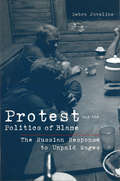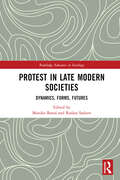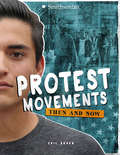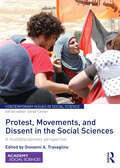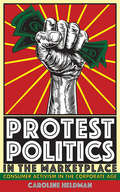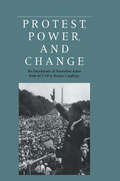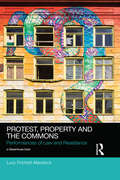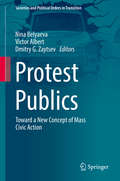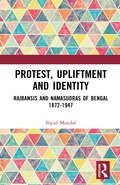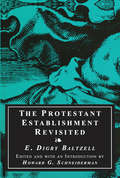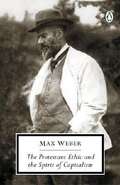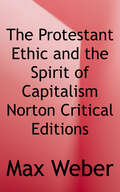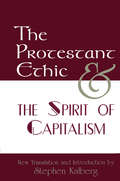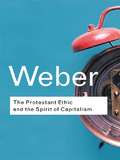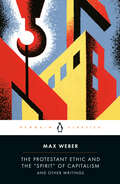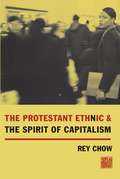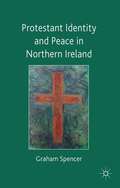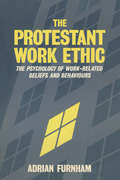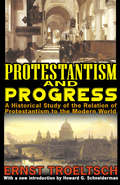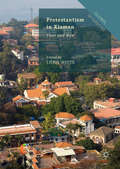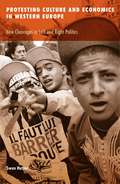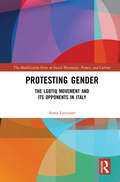- Table View
- List View
Protest and the Politics of Blame: The Russian Response to Unpaid Wages
by Debra JavelineThe wage arrears crisis has been one of the biggest problems facing contemporary Russia. At its peak, it has involved some $10 billion worth of unpaid wages and has affected approximately 70 percent of the workforce. Yet public protest in the country has been rather limited. The relative passivity of most Russians in the face of such desperate circumstances is a puzzle for students of both collective action and Russian politics. In Protest and the Politics of Blame, Debra Javeline shows that to understand the Russian public's reaction to wage delays, one must examine the ease or difficulty of attributing blame for the crisis. Previous studies have tried to explain the Russian response to economic hardship by focusing on the economic, organizational, psychological, cultural, and other obstacles that prevent Russians from acting collectively. Challenging the conventional wisdom by testing these alternative explanations with data from an original nationwide survey, Javeline finds that many of the alternative explanations come up short. Instead, she focuses on the need to specify blame among the dizzying number of culprits and potential problem solvers in the crisis, including Russia's central authorities, local authorities, and enterprise managers. Javeline shows that understanding causal relationships drives human behavior and that specificity in blame attribution for a problem influences whether people address that problem through protest. Debra Javeline is Assistant Professor of Political Science, Rice University.
Protest in Late Modern Societies: Dynamics, Forms, Futures (Routledge Advances in Sociology)
by Monika Banaś Ruslan SaduovThis book discusses a broadly understood phenomenon of protest from several perspectives, including historical, cultural, social, political, environmental and semiotic. Through their analyses, the authors undertake to envision the possible evolution of the forms of contestation in the further decades of the 21st century, taking into account the specificity of the globalisation processes. A multidimensional approach offered in this volume makes it possible to capture and identify new features of contemporary contestation and those that seem unchanged despite the passage of time and altering audiences. Examples from Europe (France, the United Kingdom, Italy, Ireland, Malta, Bulgaria, Poland, Belarus, Russia), America (the United States, Mexico, Chile) and Far East (Hong Kong and China) are relevant case studies that show the faces of contestation while reaching for new or modified rhetoric, symbolism, communication channels and the so-called modus operandi of protest initiators, active and passive participants and short- and long-distant observers. The book will be of value to a wide audience, particularly to the researchers studying contestation, social resistance, individual and collective disobedience, crisis management and cultural/social dynamic of protests. It will also be of interest to experts and individuals from outside the academia like civil activists, practitioners and NGOs compelled by contemporary processes (tensions) occurring between the state, power, society and individuals.
Protest Movements: Then and Now (America: 50 Years of Change)
by Eric BraunDiscusses the main concerns of the protest movements of the 1960s and how those have evolved since; what's changed for the better, what might be worse, and where do we go from here.
Protest, Movements, and Dissent in the Social Sciences: A multidisciplinary perspective (Contemporary Issues in Social Science)
by Giovanni A. TravaglinoDrawing on a wide range of social science disciplines and approaches, each chapter in this book offers a comprehensive analysis of social protest, political dissent and collective action. The distinguished scholars contributing to the book discuss some of the key theoretical and methodological issues in social protest research, and analyse recent instances of collective dissent around the globe, ranging from the 15M movement in Spain, to the 2011 Salford riots in the UK, to Pro-Palestinian activism in Jerusalem. The result of these contributions is a sophisticated and multifaceted collection that enriches our understanding of why, when, and how groups of people decide to act collectively in order to pursue political change. The book is a timely testament to the vitality of the field. This book was originally published as a special issue of Contemporary Social Science.
Protest Politics in the Marketplace: Consumer Activism in the Corporate Age
by Caroline HeldmanProtest Politics in the Marketplace examines how social media has revolutionized the use and effectiveness of consumer activism. In her groundbreaking book, Caroline Heldman emphasizes that consumer activism is a democratizing force that improves political participation, self-governance, and the accountability of corporations and the government. She also investigates the use of these tactics by conservatives.Heldman analyzes the democratic implications of boycotting, socially responsible investing, social media campaigns, and direct consumer actions, highlighting the ways in which such consumer activism serves as a countervailing force against corporate power in politics. In Protest Politics in the Marketplace, she blends democratic theory with data, historical analysis, and coverage of consumer campaigns for civil rights, environmental conservation, animal rights, gender justice, LGBT rights, and other causes. Using an inter-disciplinary approach applicable to political theorists and sociologists, Americanists, and scholars of business, the environment, and social movements, Heldman considers activism in the marketplace from the Boston Tea Party to the present. In doing so, she provides readers with a clearer understanding of the new, permanent environment of consumer activism in which they operate.
Protest, Power, and Change: An Encyclopedia of Nonviolent Action from ACT-UP to Women's Suffrage
by Roger Powers SFirst published in 1997. Routledge is an imprint of Taylor & Francis, an informa company.
Protest, Property and the Commons: Performances of Law and Resistance (Social Justice)
by Lucy Finchett-MaddockProtest, Property and the Commons focuses on the alternative property narratives of ‘social centres’, or political squats, and how the spaces and their communities create their own – resistant – form of law. Drawing on critical legal theory, legal pluralism, legal geography, poststructuralism and new materialism, the book considers how protest movements both use state law and create new, more informal, legalities in order to forge a practice of resistance. Invaluable for anyone working within the area of informal property in land, commons, protest and adverse possession, this book offers a ground-breaking account of the integral role of time, space and performance in the instituting processes of law and resistance.
Protest Publics: Toward a New Concept of Mass Civic Action (Societies and Political Orders in Transition)
by Victor Albert Nina Belyaeva Dmitry G. ZaytsevThis book examines the waves of protest that broke out in the 2010s as the collective actions of self-organized publics. Drawing on theories of publics/counter-publics and developing an analytical framework that allows the comparison of different country cases, this volume explores the transformation from spontaneous demonstrations, driven by civic outrage against injustice to more institutionalized forms of protest. Presenting comparative research and case studies on e.g. the Portuguese Generation in Trouble, the Arab Spring in Northern Africa, or Occupy Wall Street in the USA, the authors explore how protest publics emerge and evolve in very different ways – from creating many small citizen groups focused on particular projects to more articulated political agendas for both state and society. These protest publics have provoked and legitimized concrete socio-political changes, altering the balance of power in specific political spaces, and in some cases generating profound moments of instability that can lead both to revolutions and to peaceful transformations of political institutions.The authors argue that this recent wave of protests is driven by a new type of social actor: self-organized publics. In some cases these protest publics can lead to democratic reform and redistributive policies, while in others they can produce destabilization, ethnic and nationalist populism, and authoritarianism. This book will help readers to better understand how seemingly spontaneous public events and protests evolve into meaningful, well-structured collective action and come to shape political processes in diverse regions of the globe.
Protest, Upliftment and Identity: Rajbansis and Namasudras of Bengal 1872-1947
by Bipul MandalThe period from 1872-1947 witnessed the rise of many movements in Bengal, where those who were considered lower castes were mobilised to protest against the inequality and injustice meted out to them in various fields, including religion, politics and education. The focus of their struggle was the social injustice within the Hindu caste hierarchy. Unlike in south and western India where caste movements were often associated with anti-Brahmanical movements, in Bengal it was upgradation of caste from Sudra to Kshatriya varna. The main focus of the study is the Kshatriyaization movement of Rajbansis, the Matua movement of Namasudras, and the colonial policy of ‘Protective Discrimination’ and its impact. It studies the attempt by Rajbansi community to establish themselves as Kshatriyas in the first half of the twentieth century, though the movement started in the late nineteenth century itself. It also includes their struggle against the Brahmanical dominance and the elites of their own community. Alongside the Kshatriyaization movement, a parallel movement for the social uplift started among the Namasudra community, which later spread to northern Bengal. Their struggle actually began from the time of the first Census in 1872, when the census authorities classified the Namasudras as Chandals in the census report. The Namasudra protest movement, hereafter, developed through a different channel provided by a Vaishnava religious sect named Matua, started under a Namasudra leader Harichand Thakur. This book is essential for those wishing to understand the socio-religious movement of the Namasudra and the Rajbansi communities in their historical context. Print edition not for sale in India, Pakistan, Nepal, Bhutan, Bangladesh and Sri Lanka.
Protestant, Catholic, Jew: An Essay in American Religious Sociology
by Will Herberg"The most honored discussion of American religion in mid-twentieth century times is Will Herberg's Protestant-Catholic-Jew. . . . [It] spoke precisely to the mid-century condition and speaks in still applicable ways to the American condition and, at its best, the human condition." --Martin E. Marty, from the Introduction"In Protestant-Catholic-Jew Will Herberg has written the most fascinating essay on the religious sociology of America that has appeared in decades. He has digested all the relevant historical, sociological and other analytical studies, but the product is no mere summary of previous findings. He has made these findings the basis of a new and creative approach to the American scene. It throws as much light on American society as a whole as it does on the peculiarly religious aspects of American life. Mr. Herberg . . . illumines many facets of the American reality, and each chapter presents surprising, and yet very compelling, theses about the religious life of this country. Of all these perhaps the most telling is his thesis that America is not so much a melting pot as three fairly separate melting pots." --Reinhold Niebuhr, New Yorks Times Book Review
The Protestant Establishment Revisited
by E. Digby BaltzellIn the latter half of the twentieth century, The American upper class has become less like an aristocracy governing and guiding the nation and more like a caste, a privileged and closed body whose contribution to national leadership has steadily declined. This loss of power and authority has been the focus of the work of E. Digby Baltzell, whose 1964 work, The Protestant Establishment, analyzed the fate and function of a predominantly Anglo-Saxon and Protestant upper class in an ethnically and religiously heterogeneous democracy. After 27 years, Baltzell's theory of the structure and function of the establishment remains unique in the literature of class stratification and authority.Baltzell views an open and authoritative establishment as a necessary and desirable part of the process of securing responsible leaders in a democratic society. Such an establishment is the product of upper-class institutions that are open to talented individuals of varying ethnic and social backgrounds. The values of upper-class tradition include an aristocratic ethos emphasizing the duty to lead, as opposed to the snobbish ethos of caste that emphasizes only the right to privilege. Baltzell regards this as a protector of freedom in modern democratic societies, guaranteeing rules of fair play in contests of power and opinion.As Baltzell points out, historically, the alternatives to rule by establishments have been, rule by functionaries and demogogues, neither of which has proven satisfactory in protecting freedoms. As against Marxists, who see hegemony as a social evil, Baltzell, following Tocqueville, sees it as necessary to the well-being of society. Hegemonic establishments give coherence to the social spheres of greatest contest. They do not eliminate conflict, but prevent it from ripping society apart.Baltzell's work provides uncommon insight into the relationship of social class and personal power in contemporary America. This book will be of inte
The Protestant Ethic and Other Writings
by Max WeberIn The Protestant Ethic, Max Weber opposes the Marxist concept of dialectical materialism and relates the rise of the capitalist economy to the Calvinist belief in the moral value of hard work and the fulfillment of one's worldly duties. Edited, introduced and translated by Gordon C. Wells and Peter Baehr
The Protestant Ethic and the Spirit of Capitalism (Norton Critical Editions Series)
by Max WeberThis landmark work sets out the relationship between Western religious ethos and the emergence and growth of capitalism; its thesis being that the values of hard work and industry at the core of ascetic Protestantism made it possible for modern rational capitalism to flourish. <p><p>This Norton Critical Edition is based on the Talcott Parsons translation (1930). It is accompanied by the Translator's Note and explanatory annotations."Interpretations" includes five major scholarly essays on Weber and The Protestant Ethic and the Spirit of Capitalism by Ola Agevall, Richard F. Hamilton, Gudmund Hernes, Peter Breiner, and Richard Swedberg.A Chronology of Weber's life and work, a Selected Bibliography, and an Index are also included.
The Protestant Ethic and the Spirit of Capitalism
by Max WeberFor the first time in 70 years, a new translation of Max Weber's classic The Protestant Ethic and the Spirit of Capitalism --one of the seminal works in sociology-- published in September 2001. Translator Stephen Kalberg is an internationally acclaimed Weberian scholar, and in this new translation he offers a precise and nuanced rendering that captures both Weber's style and the unusual subtlety of his descriptions and causal arguments. Weber's original italicization, highlighting major themes, has been restored, and Kalberg has standardized Weber's terminology to better facilitate understanding of the various twists and turns in his complex lines of reasoning.Weber's compelling work remains influential for these reasons: it explores the continuing debate regarding the origins and legacy of modem capitalism in the West; it helps the reader understand today's global economic development; and it plumbs the deep cultural forces that affect contemporary work life and the workplace in the United States and Europe.This new edition/translation also includes a glossary; Weber's 1906 essay, "The Protestant Sects and the Spirit of Capitalism"; and Weber's masterful prefatory remarks to his Collected Essays in the Sociology of Religion, in which he defines the uniqueness of Western societies and asks what "ideas and interests" combined to create modem Western rationalism
The Protestant Ethic and the Spirit of Capitalism (Routledge Classics)
by Max WeberMax Weber's best-known and most controversial work, The Protestant Ethic and the Spirit of Capitalism, first published in 1904, remains to this day a powerful and fascinating read. Weber's highly accessible style is just one of many reasons for his continuing popularity. The book contends that the Protestant ethic made possible and encouraged the development of capitalism in the West. Widely considered as the most informed work ever written on the social effects of advanced capitalism, The Protestant Ethic and the Spirit of Capitalism holds its own as one of the most significant books of the twentieth century. The book is one of those rare works of scholarship which no informed citizen can afford to ignore.
The Protestant Ethic and the Spirit of Capitalism
by Max WeberIn The Protestant Ethic, Max Weber opposes the Marxist concept of dialectical materialism and relates the rise of the capitalist economy to the Calvinist belief in the moral value of hard work and the fulfillment of one's worldly duties. Based on the original 1905 edition, this volume includes, along with Weber's treatise, an illuminating introduction, a wealth of explanatory notes, and exemplary responses and remarks-both from Weber and his critics-sparked by publication of The Protestant Ethic and the Spirit of Capitalism. This is the first English translation of the 1905 German text and the first volume to include Weber's unexpurgated responses to his critics, which reveal important developments in and clarifications of Weber's argument.
The Protestant Ethic and the Spirit of Capitalism: and Other Writings
by Max Weber Peter Baehr Gordon C. WellsIn The Protestant Ethic, Max Weber opposes the Marxist concept of dialectical materialism and relates the rise of the capitalist economy to the Calvinist belief in the moral value of hard work and the fulfillment of one's worldly duties.
The Protestant Ethic and the Spirit of Capitalism: and Other Writings
by Max Weber Peter Baehr Gordon C. WellsIn The Protestant Ethic, Max Weber opposes the Marxist concept of dialectical materialism and relates the rise of the capitalist economy to the Calvinist belief in the moral value of hard work and the fulfillment of one's worldly duties.
The Protestant Ethnic and the Spirit of Capitalism
by Rey ChowIn late-capitalist Western society, cross-ethnic cultural transactions are an inevitable daily routine. Yet, according to acclaimed cultural critic Rey Chow, the notion of ethnicity as it is currently used is theoretically ambivalent, confusing, indeed self-contradictory, straddling as it does an uneasy boundary between a universalist rhetoric of inclusion on the one hand, and actual, lived experiences of violence and intolerance on the other. To drastically reconceptualize ethnicity in the contemporary world, Chow proposes that it be examined in conjunction with Max Weber's famous theory about the Protestant work ethic and capitalism, which holds that secular belief in salvation often collaborates effectively with the interpellation, disciplining, and rewarding of subjects constituted by specific forms of labor. The charged figure that results from such a collaboration, resonant with the economic, psychological, and spiritual implications of the word "protest, " is what she refers to as the protestant ethnic.Chow explores the vicissitudes of cross-ethnic representational politics in a diverse range of texts across multiple genres, including the writings of Georg Lukacs, Michel Foucault, Max Weber, Jacques Derrida, Fredric Jameson, Etienne Balibar, Charlotte Brontë, Garrett Hongo, John Yau, and Frantz Fanon; the films of Alfred Hitchcock, Marguerite Duras, and Alain Resnais; and the cartoon drawings of Larry Feign. Tracing out hauntingly familiar scenarios from stereotyping and coercive mimeticism to collective narcissistic abjection, the rise of white feminist racial power, and intraethnic ressentiment, Chow articulates a series of interlocking critical dialogues that challenge readers into hitherto unimagined ways of thinking about an urgent topic.
Protestant Identity and Peace in Northern Ireland
by Graham SpencerWhat role can and do Protestant churches play in the development of peace and stability in Northern Ireland? Drawing from interviews with a wide range of Protestant clergy, this book examines how identity impacts on the Protestant imagination and relates that identity to the possibility of peace. Using history and theology as a context for understanding the principles and values on which Protestantism is built, clergy talk about how those values and principles shape different Church attitudes towards forgiveness and reconciliation. Placing these comments alongside Catholic interviews, to demonstrate differences in Christian emphasis and conviction, the book moves towards a consideration of how positive relations between opposing communities might take shape and recommends a new outlook based on inclusive rather than exclusive narratives.
The Protestant Work Ethic: The Psychology of Work Related Beliefs and Behaviours
by Adrian FurnhamFirst Published in 1990. Routledge is an imprint of Taylor & Francis, an informa company.
Protestantism and Progress: A Historical Study of the Relation of Protestantism to the Modern World
by Ernst TroeltschErnst Troeltsch focuses his Protestantism and Progress on two main areas. First, he centers on the intellectual and religious situation, from which the significance and the possibilities of development possessed by Christianity might be deduced. This leads to an engaging historical investigation regarding the spirit of the modern world. Troeltsch argues that the modern world can only be understood in the light of its relation to earlier epochs of Christian civilization in Europe. He notes that for anyone who holds the opinion that in spite of all the significance that Catholicism retains, the living possibilities of development and progress are to be found on Protestant soil, the question regarding the relation of Protestantism to modern civilization becomes of central importance.Troeltsch also distinguishes elements in modern civilization that have proven their value from those which are merely temporary and lead nowhere. He gives the religious ideas of Christianity a shape and form capable of doing justice to the absoluteness of religious conviction, and at the same time considering them in harmony with what has actually been accomplished towards solution of the practical problems of the Christian life.A new introduction by Howard Schneiderman brings this monumental work into the twenty-first century, and explains why its ideas are more important than ever, one hundred years after its original publication.
Protestantism in Xiamen: Then and Now (Global Diversities)
by Chris WhiteThis interdisciplinary volume represents the first comprehensive English-language analysis of the development of Protestant Christianity in Xiamen from the nineteenth century to the present. This important regional study is particularly revealing due to the unbroken history of Sino-Christian interactions in Xiamen and the extensive ties that its churches have maintained with global missions and overseas Chinese Christians. Its authors draw upon a wide range of foreign missionary and Chinese official archives, local Xiamen church publications, and fieldwork data to historicize the Protestant experience in the region. Further, the local Christians’ stories demonstrate a form of sociocultural, religious and political imagination that puts into question the Euro-American model of Christendom and the Chinese Communist-controlled Three-Self Patriotic Movement. It addresses the localization of Christianity, the reinvention of local Chinese Protestant identity and heritage, and the Protestants’ engagement with the society at large. The empirical findings and analytical insights of this collection will appeal to scholars of religion, sociology and Chinese history.
Protesting Culture and Economics in Western Europe
by Swen HutterIn this far-reaching work, Swen Hutter demonstrates the usefulness of studying both electoral politics and protest politics to better understand the impacts of globalization. Hutter integrates research on cleavage politics and populist parties in Western Europe with research on social movements. He shows how major new cleavages restructured protest politics over a thirty-year period, from the 1970s through the 1990s. This major study brings back the concept of cleavages to social movement studies and connects the field with contemporary research on populism, electoral behavior, and party politics.Hutter's work extends the landmark 1995 New Social Movements in Western Europe, the book that spurred the recognition that a broad empirical frame is valuable for understanding powerful social movements. This new book shows that it is also beneficial to include the study of political parties and protest politics. While making extensive use of public opinion, protest event, and election campaigning data, Hutter skillfully employs contemporary data from six West European societies--Austria, Britain, France, Germany, the Netherlands, and Switzerland--to account for responses to protest events and political issues across countries.Protesting Culture and Economics in Western Europe makes productive empirical, methodological, and theoretical contributions to the study of social movements and comparative politics. Empirically, it employs a new approach, along with new data, to explain changes in European politics over several decades. Methodologically, it makes rigorous yet creative use of diverse datasets in innovative ways, particularly across national borders. And theoretically, it makes a strong claim for considering the distinctive politics of protest across various issue domains as it investigates the asymmetrical politics of protest from left and right.
Protesting Gender: The LGBTIQ Movement and its Opponents in Italy (The Mobilization Series on Social Movements, Protest, and Culture)
by Anna LavizzariDrawing on fieldwork conducted in Italy among political activists of the LGBTIQ movement and the traditionalist movement during the “anti-gender” campaign, this book provides a dynamic picture of their sustained interactions. Through an analysis of the contentious strategies, discourses, and performances of both the LGBTIQ and the traditionalist movements from a strategic interactionist perspective, it considers the key actors involved in this struggle over normative and social change, showing how activists on both sides are confronted with different dilemmas, influencing each other’s choices, practices and identities at the individual and collective levels. Approaching social movements as interactive processes, the author deploys the concepts of social performance and gender performativity to illustrate the ways in which activists interact with and within gender norms, and how they reproduce or contest gender hierarchies as they protest, thus revealing the centrality of gender to the analysis of processes of recruitment and mobilization, strategies, frames and forms of organization. As such, it will appeal to scholars of sociology and political science with interests in social movements and gender.
